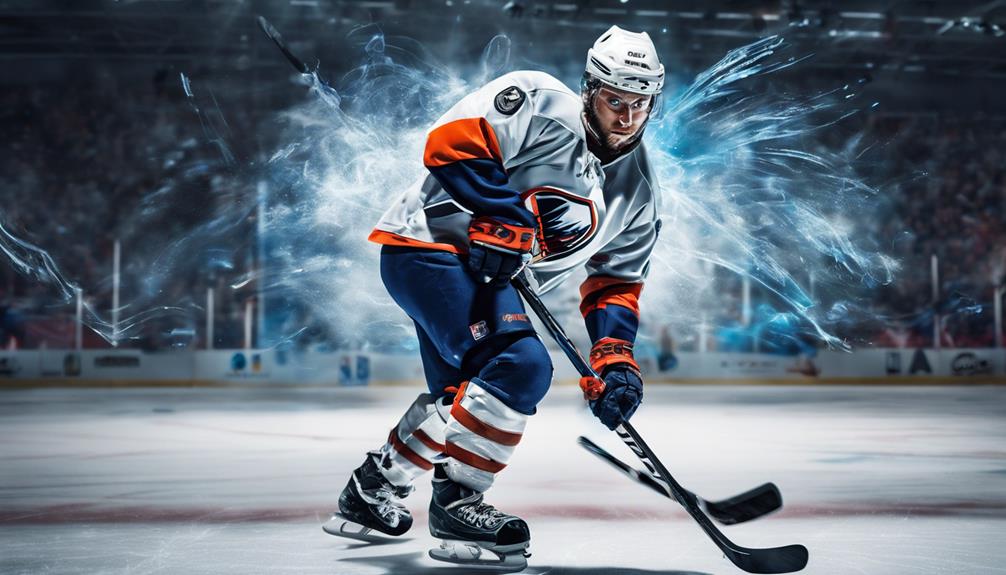Hockey is a sport that demands physical endurance, skill, and teamwork. Have you ever wondered how many calories are burned during a game of hockey?
The answer may surprise you. The intensity of gameplay, duration of matches, and individual player factors all play a role in determining the calorie expenditure during a hockey game.
Understanding these aspects can not only help players optimize their performance but also shed light on the significant impact hockey can have on one's fitness goals.
Calories Burned Playing Hockey
Playing hockey can burn a substantial amount of calories due to the high intensity and physical demands of the sport. A typical one-hour hockey workout can result in a significant caloric expenditure, with estimations ranging from 400 to 1000 calories burned, depending on factors such as weight, intensity of play, and individual fitness levels.
The nature of hockey, with its rapid shifts between anaerobic bursts and sustained aerobic effort, contributes to its effectiveness as a calorie-burning activity. Engaging in a hockey game or practice session involves continuous movement, quick sprints, sudden stops, and rapid changes in direction, all of which elevate heart rate and energy expenditure.
Understanding the caloric demands of hockey can help players tailor their training and nutrition for optimal performance.
Factors Impacting Caloric Expenditure
Factors impacting caloric expenditure during hockey include the player's weight, level of intensity, and overall fitness level. Intensity levels play a crucial role in determining the number of calories burned during a hockey game. Higher intensity levels lead to a greater calorie burn due to increased energy expenditure.
Additionally, the duration of the game also affects the overall caloric expenditure. Longer games result in more extended periods of physical activity, leading to higher calorie consumption. Moreover, a player's weight influences the amount of energy expended during gameplay. Heavier individuals typically burn more calories as they require more energy to move their bodies.
Understanding these factors can help players optimize their performance and calorie expenditure during hockey games.
Calorie Comparison: Hockey Vs. Other Sports
In comparing the caloric expenditure of hockey to other sports, it is essential to consider various factors contributing to energy consumption during physical activities.
When comparing basketball vs. hockey, hockey tends to burn more calories due to its higher intensity and constant movement on the ice. Hockey involves quick bursts of energy followed by brief periods of rest, leading to a higher overall calorie burn compared to basketball.
On the other hand, soccer vs. hockey shows that soccer players cover more ground during a game. Still, hockey players engage in more anaerobic activities like sprinting and sudden stops, resulting in a comparable or even higher caloric expenditure.
Ultimately, the choice between these sports can depend on personal preferences and fitness goals.
Tips to Maximize Calorie Burn
To optimize calorie burn during hockey sessions, implementing efficient training techniques and strategic dietary choices can significantly enhance overall energy expenditure. Engaging in high-intensity drills and workouts can elevate your heart rate, leading to a greater calorie burn. Additionally, focusing on interval training during practice sessions can further boost metabolic rate and calorie consumption.
Ensuring that your pre-game meal includes a balance of complex carbohydrates and lean proteins can provide sustained energy levels for an effective workout. Hydration is also essential to support performance and maintain calorie-burning capacity.
Tracking and Monitoring Caloric Intake and Expenditure
Monitoring caloric intake and expenditure is crucial for individuals looking to optimize their performance and achieve their fitness goals effectively. Maintaining a caloric balance is essential, as consuming more calories than expended leads to weight gain, while a caloric deficit results in weight loss.
Activity tracking through apps or wearable devices can help individuals monitor their daily calorie expenditure accurately. These tools provide valuable insights into the number of calories burned during exercise and daily activities.
Frequently Asked Questions
Can Playing Hockey Help Improve Cardiovascular Fitness?
Playing hockey can significantly boost cardiovascular fitness. This dynamic sport challenges the heart, enhancing endurance and promoting weight loss through high energy expenditure. Engaging in hockey fosters heart health and increases overall physical stamina.
Is There a Difference in Calorie Burn Between Ice Hockey and Roller Hockey?
When comparing ice hockey to roller hockey in terms of equipment and player skill levels, distinct differences emerge. Ice hockey requires ice skates, sticks, and protective gear, while roller hockey involves inline skates and similar protective equipment. Ice hockey typically attracts more skilled players due to the technical demands of skating on ice.
Are There Specific Drills or Exercises That Can Help Increase Calorie Burn During a Hockey Game?
Engaging in interval training during hockey games can enhance calorie burn. Intervals of high intensity followed by short rest periods elevate heart rate and energy expenditure. Incorporating plyometric exercises like jumps and sprints can further amplify calorie-burning potential.
How Does the Intensity of a Hockey Game Impact the Number of Calories Burned?
The intensity levels of a hockey game directly impact the calorie expenditure. Higher intensity levels, involving quick sprints, rapid changes in direction, and physical contact, lead to greater energy expenditure, resulting in a higher number of calories burned during the game.
Is There a Recommended Pre-Game Meal or Snack to Help Optimize Calorie Burn During a Hockey Game?
Optimizing performance during a hockey game involves strategic pre-game nutrition. Prioritize pre-game hydration with water or sports drinks. Choose easily digestible carbohydrates and lean protein for sustained energy. Post-game, focus on recovery with a mix of protein and carbohydrates to replenish glycogen stores.









